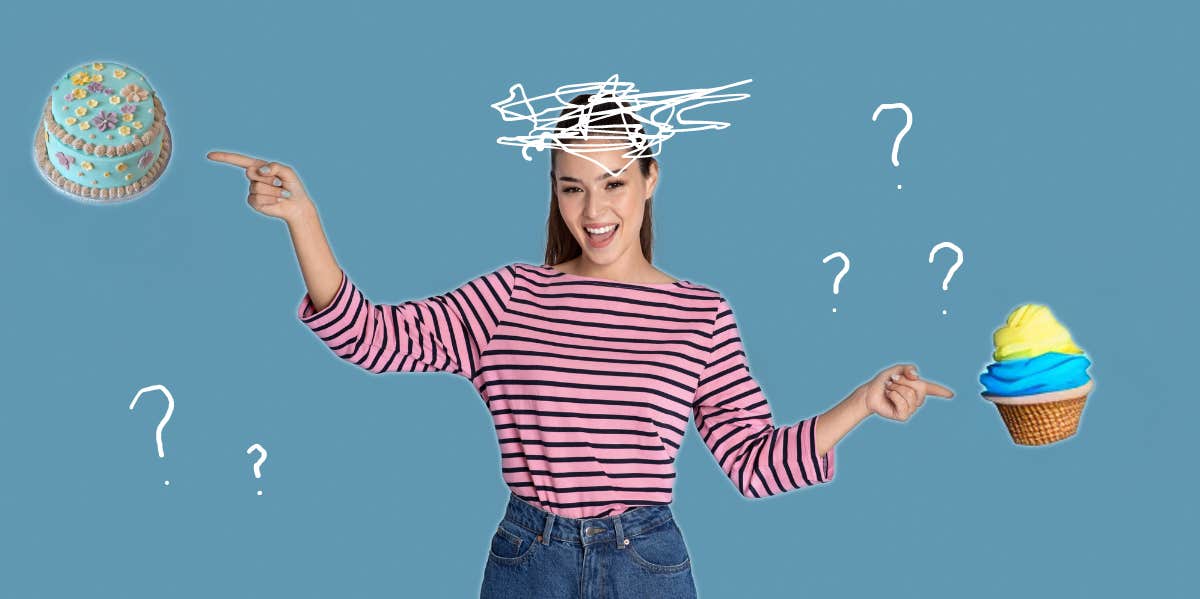Why Having Too Many Options Makes You Less Satisfied With Your Decisions
Yes, it's entirely possible to have too much of a good thing.
 Prostock-studio / Shutterstock
Prostock-studio / Shutterstock Everyone wants to have a number of options to choose from in most situations in life. An abundance of choice is a good thing because if one thing doesn’t work for you, there are several others that might.
But there is a downside to such extensive freedom of choice. It’s a phenomenon called "the paradox of choice," which is essentially a case of choice overload that you could experience when too many options are on the table.
The paradox of choice is a psychological phenomenon in which too many options can lead to anxiety and feelings of dissatisfaction. TikToker Mathanigus, explains how this phenomenon works.
What is the paradox of choice?
American psychologist Barry Schwartz explained how the paradox of choice works in his 2004 book, "Paradox of Choice: Why More Is Less."
He explains why having too many choices can actually make people feel worse and create unnecessary anxiety.
Schwarz argued that the number of choices from the extremely important things (like career, family, and finance) to the mundane (like what movie to see or restaurant to eat at) had become a problem instead of a solution.
Although making our own decisions and autonomy are vital to our well-being, we might have way too many choices. According to Mathanigus, “The more choices you have, the more unhappy you are with the choice that you finally make.”
If you have 10 things to choose from and you pick one, it means you are rejecting the others and, in the back of your mind, you will always wonder if you should have selected a different option. That leaves you doubtful and less satisfied about what you ended up with.
What causes the paradox of choice?
The paradox of choice is akin to "analysis paralysis, where you go over the options ad nauseam. With fewer options, you are better able to eliminate things that don’t fit your needs without worrying that you have made a big mistake.
Schwartz identified the following steps people take when weighing their options:
- Figure out what you goal is.
- Determine how important the goal is.
- Lay out the options.
- Analyze how likely the options are to help you meet your goals.
- Choose the winning option.
- Re-evaluate and modify as necessary.
Because of that process, it’s easy to see why a smorgasbord of choices would be more of a burden than an advantage.
It can become overwhelming and difficult to know what decision is "right" for you. Then, there is FOMO (fear of missing out) to contend with, which is a sense that there is something better for you out there.
Schwartz was first interested in a study that was conducted by behavioral science experts, Sheena Iyengar and Mark Lepper, in 2001.
They detailed an experiment where they set out to see if too many options caused consumers to buy less and wrote about it in their paper, “When Choice is Demotivating: Can One Desire Too Much Of A Good Thing?”
Two different groups were given the choice of either six different jams to try or 24. More people stopped at the display table with 24 jams and tried them, but the people with a limited choice were more likely to make a purchase.
What are the consequences of the paradox of choice?
There are several negative consequences for people who get caught up in the paradox of choice.
They can become chronically dissatisfied, less dedicated to the decisions they did make, and so overwhelmed that they freeze completely. This inability to be content can cause things like depression or a lack of fulfillment in life.
With dating apps like Tinder and Bumble, people are bombarded with options when looking for a partner. The downside is that once they settle down, they are less invested, on the fence about whether they chose correctly, and more willing to walk away because they know there are plenty more fish in the sea.
Even without the scientific evidence, it’s easy to see that people are becoming more and more fickle when it comes to relationships, careers, and goals, eternally in search of the next best thing, believing that the grass is always greener elsewhere.
NyRee Ausler is a writer from Seattle, Washington, who specializes in content about self-care, self-love, self-enlightenment, interpersonal relationships, and personalities. She strives to deliver informative and entertaining content you can use to help navigate life.

